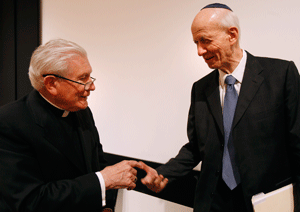The “ambiguities” in a seven-year-old document from Catholic and Jewish dialogue partners are continuing to cause confusion, two committees of the U.S. Conference of Catholic Bishops said in June. The U.S.C.C.B. said the Catholic section of a 2002 document, Reflections on Covenant and Mission, written by participants in an ongoing dialogue between the National Council of Synagogues and the U.S.C.C.B., “contains some statements that are insufficiently precise and potentially misleading.” In a note issued during the bishops’ spring meeting, the committees said, “Reflections on Covenant and Mission should not be taken as an authoritative presentation of the teaching of the Catholic Church.” By stating that the Jewish people’s “witness to the kingdom...must not be curtailed by seeking the conversion of the Jewish people to Christianity,” the document “could lead some to conclude mistakenly that Jews have an obligation not to become Christian and that the church has a corresponding obligation not to baptize Jews,” the committee wrote.
The heads of several major U.S. Jewish organizations said the bishops’ statement was a setback for Catholic-Jewish relations. “The whole basis of dialogue has had a major monkey wrench thrown into it,” Rabbi Gary Greenebaum of the American Jewish Committee told The Los Angeles Times. “What it feels like to Jews is that this is a major breach of trust.”








